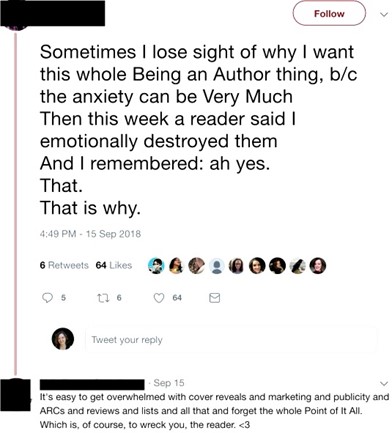83. How Can Fans Heal from Stories That ‘Wreck’ Us? | with Marian Jacobs
Podcast: Play in new window | Download (0.0KB) | Embed
Episode sponsors
Some years back on Twitter, a novelist shared a strange boast. “Sometimes I lose sight of why I want this whole Being an Author thing,” she said. “It’s easy to get overwhelmed … and forget the whole point of it all. Which is, of course, to wreck you, the reader.” Fascinating. Do we really want books to wreck us? Don’t wrecks injure people? Novelist and Lorehaven writer Marian Jacobs takes a very controversial position against steering story vehicles directly into our souls. She insists we should find stories that don’t hurt us, but help us heal.

Introducing Marian Jacobs
Marian Jacobs writes about Jesus, monsters, and spaceships. Her work is featured at Desiring God as well as Stage and Story. She and her family live in Palm Springs, California. Subscribe to her free email newsletter and get her free novel Automated, a steampunk Pinocchio retelling for readers age 12 and older.
 Clips from Marian’s articles at Lorehaven
Clips from Marian’s articles at Lorehaven
As we’ve covered, books can help you restore your soul “when sorrows like sea billows roll.” Now I’d like to focus more on what not to read. During challenging seasons, do we turn to soul-satisfying stories, or to novels that have the potential to tear us apart?
I don’t suggest we avoid adrenaline-inducing stories altogether. Instead, let’s be mindful about which stories we read, how often we read them, and how they can even harm us.
Good stories do not simply “wreck the reader,” but end by healing their wounds in such a way that says, “My friend, there is lasting hope in the end. The light shines in the darkness, and the darkness will never overcome it.”
Christ does not delight in our suffering because he knows suffering even more than Job. Jesus abounds in compassion, love, and empathy. But he also understands that we must suffer for our good and his glory.
Good books should imitate Jesus, harming only with intent to heal.
Questions we explore
- How did you first discover biblical truth and fantastical fiction?
- What experiences and stories led you to explore hurtful and healing fiction?
- Why do readers misunderstand, get confused, or agree about these truths?
Com station
Autumn Grayson wrote about episode 82:
When I hear them talk about ‘church back home’ syndrome, it seems that they are moreso trying to point out the unreasonable or toxic reactions that people might have in reaction to their church back home. Like if the person automatically thinks it’s a good idea to just do things the opposite of their church back home, instead of having a nuanced view that makes decisions based on what actually works and what doesn’t. Or, there’s some people that act like all of Christianity or every church is exactly like ‘the church back home’ even when that obviously isn’t true.
It’s good to point out problems that are there and have (reasonable) discussions and debates about them, but that doesn’t mean ignoring times when people have unhealthy reactions to the church too. It’s hard to fix problems if we hammer really hard on one side and are completely forced to ignore the other.
Next on Fantastical Truth
“Christian fiction is all so cringe and cheesy.” So say many critics over the years. But one author is challenging this line: Daniel Silliman, Christianity Today news editor, and author of the new nonfiction book Reading Evangelicals. He surveys five titles, including three popular fantastical novels. Daniel joins us to explore big questions: Why did Christian readers love these books? And how did they change evangelicals’ imaginations and build our communities?






























Slightly tangential: One of the shows that surprised me was Netflix’s Centaurworld, one of the weirdest things I’ve laid eyes on, but since I, like many people, am an absolute sucker for themes about loneliness and found family, it stabbed me right in the feelings.
My dude made a mention that Sora from Kingdom Hearts would have been so much better if he had a moment like Rider did in the first five-ish minutes of the show, but Sora, like many a shounen battle hero, is too stupid to notice, bless his heart.
Clip: https://www.youtube.com/watch?v=emmHt3BhSnk&ab_channel=Obsidian.Art.s
Also they do that thing where the creepy eldritch abomination has a deceptively light and pretty song, which I frakkin love. Yes, ironic contrast, yessss. And creepy antlers, lookin like some kind of Bloodborne boss.
Clip [trigger warning: antlered, skullfaced eldritch abomination]: https://www.youtube.com/watch?v=HZXKh_kyKUg&ab_channel=Ech0Inthenight
Mindset is extremely important when reading, especially dark books. As much as I enjoy stories and want to be entertained by them, I also want to observe interesting characters so I can analyze their lives and learn from their successes and failures. This aids in finding patterns in human nature that make for better decisions and advice that can be given to friends when needed. I’ve gained more success and avoided a lot of trouble as a result, which makes me look at darker stories as a learning tool that is full of characters I can take a journey with, rather than something that will consume and hurt me.
This applies even to stories that are so bleak they don’t have an uplifting ending. Those stories in particular can serve as good cautionary tales. So if someone just read a dark story that hurt them, a good coping tool might be to ask what they can learn from it. Was there something that the characters did that made things turn out so poorly? If so, what was the cause and effect behind their actions, and what are some realistic ways the situation could’ve been prevented or fixed? Over time, this exercise can help cultivate a problem solving mentality in the reader, which can reduce the feelings of sadness, fear, and helplessness that sometimes makes these stories feel so painful.
For me, there’s been lots of stories that were very dark but still contained a ray of hope. One issue, however, is that people often don’t pay enough attention to see that ray. They get so caught up in the hardships of the story that they don’t realize where the story is going, what it’s saying or the good things that can be drawn from it.
It’s like walking through a dark tunnel with someone, and after a while they stop, face the wall, and refuse to move forward. Even after telling them about the light at the end, their mind doesn’t change because they’re staring at the side of the tunnel and refuse to acknowledge that this particular tunnel might have a light to turn to. And then they act like there’s something wrong with the person that says there could possibly be a light in this dark tunnel in the first place. No one should feel obligated to read a book that they think is bad for them. But people should also be wary of training themselves to turn away so often that they lose their chance to build useful coping mechanisms that can help them in real life.